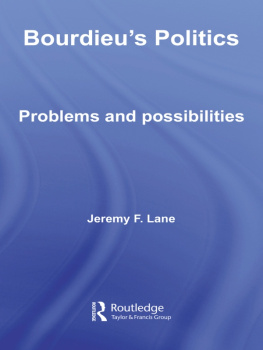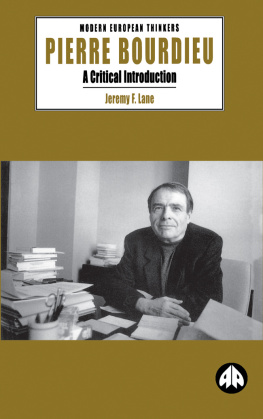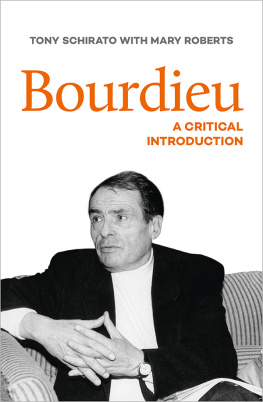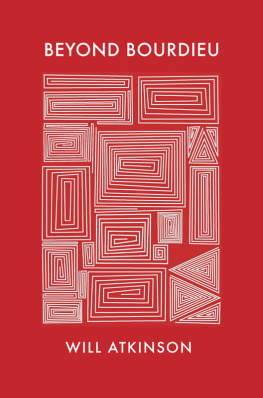Bourdieus Politics
Bourdieus academic work and his political interventions have always proved controversial, with reactions varying from passionate advocacy to savage critique. In the last decade of his career, the French sociologist Pierre Bourdieu became involved in a series of high-profile political interventions, defending the cause of striking students and workers, speaking out in the name of illegal immigrants, the homeless and the unemployed, and challenging the incursion of the market into the field of artistic and intellectual production.
This new study presents the first sustained critical analysis of the political implications of Bourdieus sociology. Through a close reading of the political speeches and pronouncements of his later years, Jeremy F. Lane provides a detailed exposition both of Bourdieus critique of neo-liberalism and of his own political position. Bourdieus theory of politics is also brought into critical dialogue with the work of a range of other commentators of a broadly Marxist or post-Marxist orientation who have also intervened in such debates theorists such as Stuart Hall, Ernesto Laclau, Chantal Mouffe, Judith Butler, Slavoj iek and Jacques Rancire.
The first sustained analysis of Bourdieus politics will seek to assess the validity of his claims as to the distinctiveness and superiority of his own field theory as a tool of political analysis. It will be of great use to students and researchers in sociology, social theory, cultural studies, French studies and political science.
Jeremy F. Lane is Senior Lecturer in the Department of French at the University of Nottingham. He has published widely on all aspects of the work of Pierre Bourdieu, most notably Pierre Bourdieu: A Critical Introduction.
Routledge Advances in Sociology
This series aims to present cutting-edge developments and debates within the field of sociology. It will provide a broad range of case studies and the latest theoretical perspectives, while covering a variety of topics, theories and issues from around the world. It is not confined to any particular school of thought.
1. Virtual Globalization
Virtual spaces/tourist spaces
Edited by David Holmes
2. The Criminal Spectre inLaw, Literature andAesthetics
Peter Hutchings
3. Immigrants and NationalIdentity in Europe
Anna Triandafyllidou
4. Constructing Risk andSafety in TechnologicalPractice
Edited by Jane Summerton andBoel Berner
5. Europeanisation, NationalIdentities and Migration
Changes in boundary constructions between Western and Eastern Europe
Willfried Spohn and AnnaTriandafyllidou
6. Language, Identity and Conflict
A comparative study of language in ethnic conflict in Europe and Eurasia
Diarmait Mac Giolla Chrost
7. Immigrant Life in the U.S.
Multi-disciplinary perspectives
Edited by Donna R. Gabacciaand Colin Wayne Leach
8. Rave Culture and Religion
Edited by Graham St. John
9. Creation and Returns of SocialCapital
A new research program
Edited by Henk Flap and BeateVlker
10. Self-Care
Embodiment, personal autonomy and the shaping of health consciousness
Christopher Ziguras
11. Mechanisms of Cooperation
Werner Raub and Jeroen Weesie
12. After the Bell EducationalSuccess, Public Policy andFamily Background
Edited by Dalton Conley andKaren Albright
13. Youth Crime and Youth Culturein the Inner City
Bill Sanders
14. Emotions and SocialMovements
Edited by Helena Flam andDebra King
15. Globalization, Uncertainty andYouth in Society
Edited by Hans-Peter Blossfeld,Erik Klijzing, Melinda Mills andKarin Kurz
16. Love, Heterosexuality andSociety
Paul Johnson
17. Agricultural Governance
Globalization and the new politics of regulation
Edited by Vaughan Higgins andGeoffrey Lawrence
18. Challenging HegemonicMasculinity
Richard Howson
19. Social Isolation in ModernSociety
Roelof Hortulanus, AnjaMachielse and LudwienMeeuwesen
20. Weber and the Persistence ofReligion
Social theory, capitalism and the sublime
Joseph W. H. Lough
21. Globalization, Uncertaintyand Late Careers inSociety
Edited by Hans-Peter Blossfeld,Sandra Buchholz and DirkHofcker
22. Bourdieus Politics
Problems and possibilities
Jeremy F. Lane
23. Media Bias in ReportingSocial Research?
The case of reviewing ethnic inequalities in education
Martyn Hammersley
First published 2006
by Routledge
2 Park Square, Milton Park, Abingdon, Oxon OX14 4RN
Simultaneously published in the USA and Canada
by Routledge
270 Madison Ave, New York, NY 10016
Routledge is an imprint of the Taylor & Francis Group, an informa business
2006 Jeremy F. Lane
This edition published in the Taylor & Francis e-Library, 2006.
To purchase your own copy of this or any of Taylor & Francis or Routledges collection of thousands of eBooks please go to www.eBookstore.tandf.co.uk.
All rights reserved. No part of this book may be reprinted or reproduced or utilised in any form or by any electronic, mechanical, or other means, now known or hereafter invented, including photocopying and recording, or in any information storage or retrieval system, without permission in writing from the publishers.
British Library Cataloguing in Publication Data
A catalogue record for this book is available from the British Library
Library of Congress Cataloging in Publication Data
A catalog record for this book has been requested
ISBN10: 0-415-36320-9 (hbk)
ISBN10: 0-203-01357-3 (ebk)
ISBN13: 978-0-415-36320-4 (hbk)
ISBN13: 978-0-203-01357-1 (ebk)
Politics is that specific activity which only exists because there is no science of politics.
(Jacques Rancire)
Acknowledgements
The writing of this book was greatly facilitated by the encouragement and advice I received from a range of colleagues and friends. I should particularly like to thank Susan Brook and Jon Beasley-Murray for the friendship, hospitality and intellectual stimulation they have provided over the past few years. I am grateful to the participants in the Sociology of Culture Reading Group at Nottingham University Alan Aldridge, Meryl Aldridge, Joseph Burridge, Roger Cox, Christian Karner, David Parker, Nick Stevenson and Claire Tinker for inviting me to join their stimulating discussions on areas of social theory, which I would not have explored without their encouragement. I should also like to thank both my colleagues in the French Department at Nottingham University and the AHRC for providing the teaching cover and financial support necessary to allow me to bring this project to completion. Final thanks go to the editors of the journals French Cultural Studies and Paragraph for allowing me to reproduce, in chapters 1 and 2, materials that first appeared, in modified form, as Neo-liberalism as imposition and invasion: problems in Bourdieus politics,






